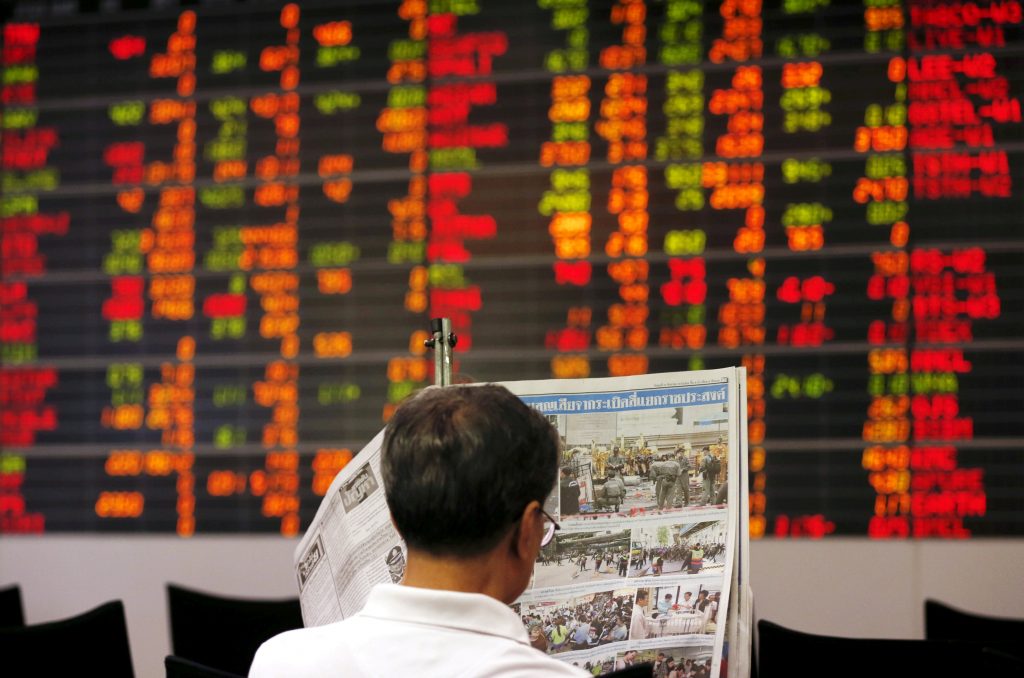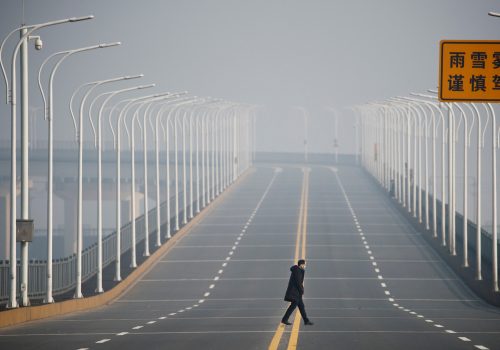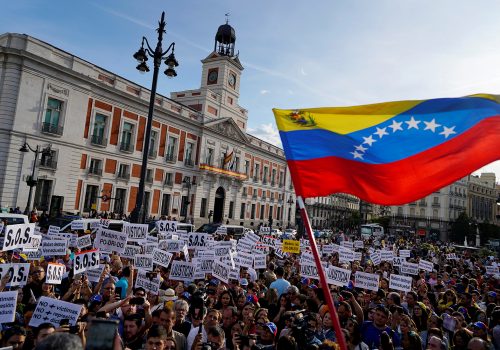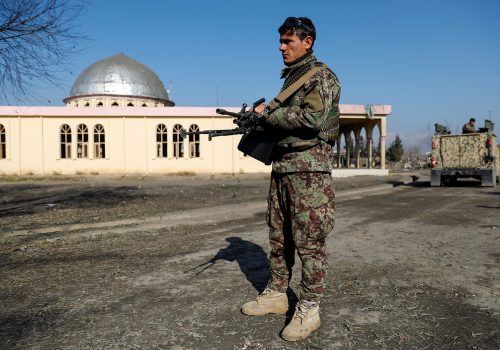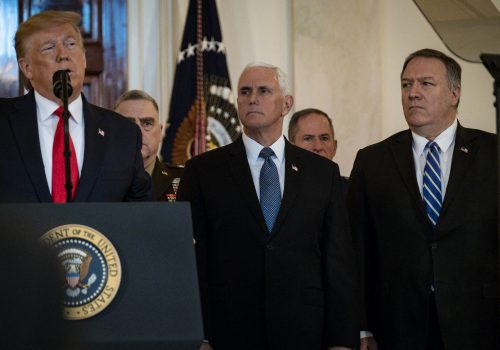Global investors are being overly complacent about downside economic risks, aggravated by but not limited to the growing impact of coronavirus.
They are underestimating the forces that are changing the very nature of the world economy – a growing degree of “deglobalization” in the face of U.S.-Chinese decoupling. At the same time, they are overestimating the power of monetary and fiscal stimulus to keep the global economic party going.
When G-20 finance ministers meet this weekend in Riyadh, they’ll do so at a time when all of the world’s ten major economies are slowing – and several confront recession. Next week, Beijing is likely to announce a delay in the meeting of its National People’s Congress due to the coronavirus outbreak.
This week, Apple raised fears of more global corporate troubles to come with a virus-caused revenue warning. The full ripple effects of the virus, and of the economic impact of humans scared to be with other humans, will show up in first quarter results, in particular in tourism, travel and on all Chinese and global companies that depend on Chinese supply chains and markets.
Despite all that, investor complacency persists in no small part due to a fundamental misunderstanding of how rapidly the world has changed, economically and politically. We are only in the opening pages of this new era of major power competition and technological change, and there’s no model to “price in” its impact.
Get the Inflection Points newsletter
Subscribe to Frederick Kempe’s weekly Inflection Points column, which focuses on the global challenges facing the United States and how to best address them.
Within democracies, the public’s faith has been shaken in capitalism and globalization to produce results that deliver greater prosperity. Most recently, that has driven everything from the recent Irish election victory of Sinn Fein, to the UK’s departure from the European Union, to the erosion of the German political center.
Most dramatic is the growing possibility that U.S. presidential elections this year could produce a showdown between two populists of different stripes but similar decibels, Donald Trump and Bernie Sanders. Both are septuagenarian insurgents who appeal to hard-core, unconventional constituencies, and that’s prompted global concern that the new U.S. normal may be abnormal.
All of that is unfolding against a backdrop of a major power test that at its heart is a systemic struggle between democratic and authoritarian capitalist models. Though traditional security analysts continue to worry about how U.S.-Chinese, U.S.-Russian or U.S.-Iranian tensions could unravel into armed conflict, the more likely outcome is a resource-sapping, continual competition that stops short of kinetics but involves information warfare, cyber assaults, and economic clashes ranging from trade wars to targeted sanctions.
But let’s get back to investors and their complacency, which is as easy to explain as it is increasingly hard to justify.
Every time the global economy approached the brink in the decade since the Great Financial Crisis of 2008-2009, some intervening force pulled us back. The latest came last year when it looked as though the global economy might slow to below 2 percent GDP growth, generally considered a way to measure the onset of a global recession.
Central banks stepped up. As the International Monetary Fund has pointed out, 49 central banks cut interest rates 71 times last year. The result was a 0.5 percent global GDP boost, according to the IMF. Monetary policy saved the day.
Investors understand that coronavirus could be a major 2020 shock, but they are wagering again that something will prevent this from being an economic disaster. They realize the U.S. Fed and other central banks may have fewer monetary tools to deploy, so they are counting on increased fiscal stimulus from governments.
For example, Chinese lenders on Thursday cut their one-year loan prime rate, which is used across the financial system, by 0.1 percentage point to 4.05 percent. The result was a rallying of Chinese stocks that day of 2.2 percent of the benchmark CSI 300 index.
That followed the Chinese central bank’s cut to its medium-term lending rate this week, as well as dozens of other measures Beijing has introduced in recent days to support businesses hit by the epidemic. The Financial Times reports that China’s central bank thus far has made 300 billion RmB available to large lenders and local banks in hard-hit areas, particularly Hubei province.
Even so, the S&P Global Ratings forecast that China’s 2020 growth could fall to 4.4 percent from its 6 percent level last year, if the coronavirus hit continues through April. Most predictions of that sort probably err on the optimistic side, and it may be wishful thinking that China’s economy will make up most of what is being lost once coronavirus recedes.
At the same time, the eurozone economy barely grew in the fourth quarter of 2019, up only 0.1 percent from the previous quarter, the slowest rate since 2013. Germany had zero growth. Real GDP in the eurozone was up just 0.9 percent in 2019, the slowest rate since 2013. (With the UK now leaving the EU, its leaders failed to agree on their budget on Friday due to insoluble differences.)
Governments across the world see these storm clouds, and a Bloomberg survey of economic forecasts shows that budgets are loosening in more than half of the world’s 20 biggest economies, providing some of the fiscal stimulus that central bankers have been seeking from their government counterparts.
Markets are wagering that the combination of fiscal and monetary measures will again prevent the worst.
However, what if they’re wrong?
Other than the United States, major central banks are tapped out, some of them experimenting with negative interest rates. Some experts argue that our low interest rate environment allows greater borrowing for fiscal stimulus.
That’s risky business.
Global debt is nearing $244 trillion, the highest level on record, and that’s not a good record to be breaking. Public debt is the highest in advanced economies since WWII. In a recent Atlantic Council report, Global Risks 2035 Update, author Mathew Burrows explores a worst-case scenario he calls “Descent into Chaos.” It starts with growing indebtedness hitting China first and then spreading to the Western world, triggering a worldwide economic meltdown.
Burrows isn’t in the business of predicting the timing of global downturns. Yet it would be unwise to take one’s eye off this ballooning debt at this moment of uncertainty.
Investors are counting on the playbook of the last decade to hold out for a little longer.
That’s a risky bet in this year of coronavirus, slowing growth, growing debt, and rising geopolitical uncertainty. We’re near the end of a bull run that’s in year ten of a seven-year cycle.
This article originally appeared on CNBC.com
Frederick Kempe is president and chief executive officer of the Atlantic Council. You can follow him on Twitter @FredKempe.
MUST-READS FROM A WORLD IN TRANSITION
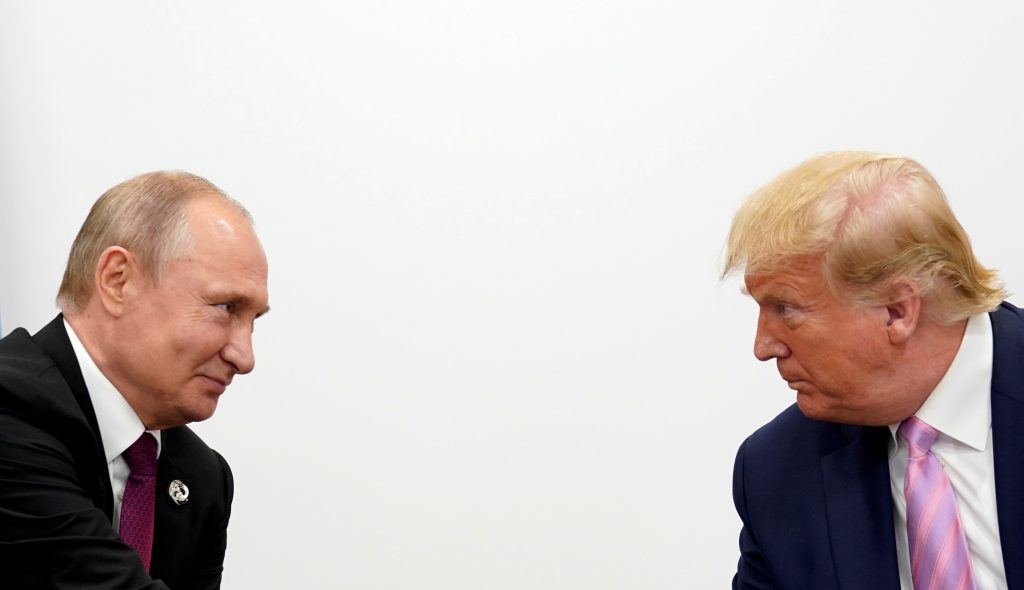
This week’s top reads include Nouriel Roubini’s look in Project Syndicate at the “blissful denial” of financial markets and Ashley J. Tellis’ rich look at U.S.-Indian relations in Foreign Affairs. New York Times reporters look at how the job of national security advisor is changing under Robert O’Brien, who came to the Atlantic Council recently to lay out his plans.
In a departure from form, Inflection Points includes some U.S. domestic politics, given Peggy Noonan’s rich look at the Bloomberg “catastrophe” in this week’s Democratic debate – and its meaning.
Don’t miss this week’s must-reads, the FT’s look at two unfolding disasters, one in Syria’s Idlib and the other on the Venezuelan border with Colombia.
#1. FINANCIAL MARKETS “BLISSFUL DENIAL”
The White Swans of 2020
Nouriel Roubini / PROJECT SYNDICATE
Famed economist Nouriel Roubini warns in Project Syndicate of financial markets blissful denial “of the many predictable global crises that could come to a head this year, particularly in the months before the US presidential election.”
In particular, he points to potential disturbances involving China, Russia, Iran and North Korea as “white swans,” rather than black swans, as it should be easier to see them coming. “Any of them could trigger severe economic, financial, political and geopolitical disturbances unlike anything since the 2008 crisis.” Read More →
#2. TRUMP IN INDIA
The Surprising Success of the U.S.-Indian Partnership
Ashley J. Tellis / FOREIGN AFFAIRS
Indian Prime Minister Narendra Modi has planned an “epic spectacle” to greet President Trump when he lands Monday in the western city of Ahmedabad for his first presidential visit to India.
Ashley Tellis delivers a brilliant scene-setter in Foreign Affairs, tracking why, three years into Trump’s “American First” presidency, “the strategic partnership with India that successive U.S. administrations have cultivated as a silent bulwark against China hasn’t just survived – it has flourished.” Read More →
#3. TRUMP AND NATIONAL SECURITY
Under O’Brien, N.S.C. Carries Out Trump’s Policy, but Doesn’t Develop It
Michael Crowley and David E. Sanger / NEW YORK TIMES
Trump’s national security advisor touts new “streamlined” National Security Council
David A. Wemer / THE ATLANTICIST
Few matters are more important than tracking the capability of President Trump’s national security team as he wrestles down a lengthening list of global challenges.
When the Atlantic Council recently hosted Robert C. O’Brien, the President’s new national security advisor, he impressed with his calm bearing, demonstrating the mettle that had made him one of America’s most effective hostage negotiators.
He laid out his plan to return the National Security Council staff to the size and effectiveness of the model introduced by General Brent Scowcroft, Atlantic Council chairman emeritus and two-time national security advisor. Read More →
New York Times reporters Michael Crowley and David E. Sanger, however, argue that by opening NSC staff meetings with printouts of Trump tweets, O’Brien is implicitly showing the job has morphed from one of advising presidents, to one “justifying, enacting or explaining” Mr. Trump’s policy.
This comes in a week when President Trump has removed his acting director of national intelligence, an act that prompted Admiral William H. McRaven (former commander of U.S. Special Operations) to pen a warning in the Washington Post of the perils “if good men …can’t speak the truth.” Read More →
#4. CAN BLOOMBERG RECOVER?
The Best Democratic Debate in Years
Peggy Noonan / WALL STREET JOURNAL
As a rule, Inflection Points doesn’t stray into U.S. domestic politics, except when it directly relates to international defining moments.
Yet as the U.S. election this year will be an Inflection Point of its own, this week’s top reads include Peggy Noonan’s rich look at this week’s stunning Democratic debate and what she called not a bad night for Bloomberg but a “catastrophe.”
“Bad news/long-shot news: it was the worst performance in recent debate history – but if he can turn it around it will be the biggest comeback in modern primary history.” Read More →
#5. LIVES ABANDONED AND FORGOTTEN
‘It looks like judgment day’: inside Syria’s final battle
Chloe Cornish in Beirut and Asmaa al-Omar in Istanbul / FINANCIAL TIMES
Venezuela: refugee crisis tests Colombia’s stability
Michael Stott in Maicao and Gideon Long in Bogotá / FINANCIAL TIMES
This week’s two must-reads come from FT reporters tracking unfolding disasters in Syria and Venezuela, and the tragic refugee flows spawned by the cruelties of dictators Assad and Maduro – and by the failure of the civilized world to effectively oppose them.
“To hundreds of thousands of people who escaped other battles,” write reporters Chloe Cornish and Asmaa al-Omar, “Idlb …is now the scene of an unfolding humanitarian disaster and the dying days of Syria’s revolution” in a civil war that already has left 500,000 dead.
Michael Stott and Gideon Long report on how the shape of the Venezuelan crisis is changing, with wealthier and middle-class refugees in the first stages now being joined by poorer, older, sicker and more vulnerable Venezuelans.
“Unlike other humanitarian crises, it is a disaster caused not by war or natural disaster but by misrule on a grand scale,” they write.
PERSON OF THE WEEK
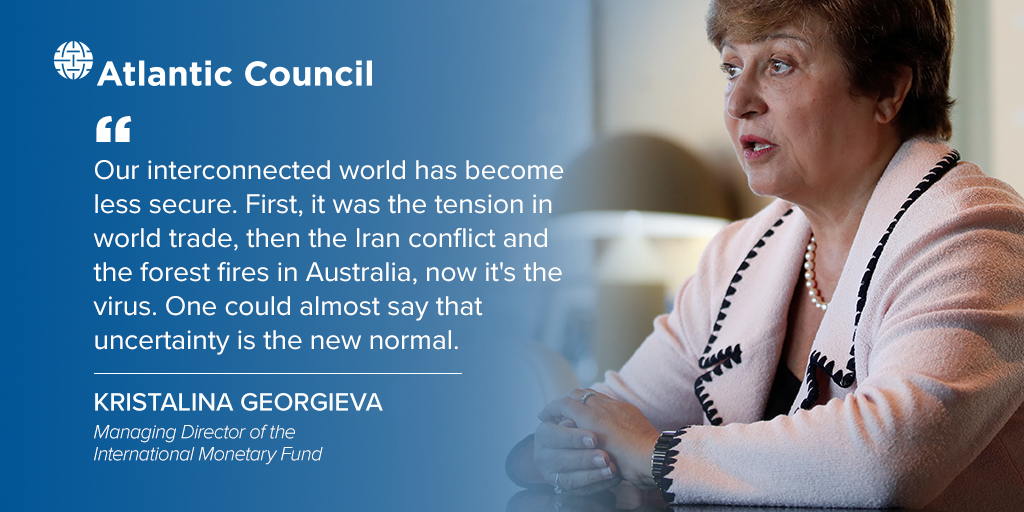
ATLANTIC COUNCIL TOP READS
Image: FILE PHOTO: A Thai investor reads a newspaper in front of an electronic board displaying live market data at a stock broker's office in Bangkok, Thailand, August 19, 2015. REUTERS/Chaiwat Subprasom/File Photo
